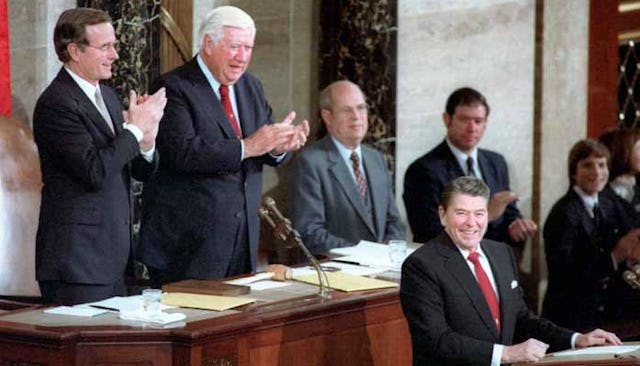When Politicians Were Boring (A Wish For My Children)

My childhood had one president, and from my elementary-school vantage point, 1980s politics had no real drama. I was 5 years old when President Reagan was elected, and I don’t remember it. Neither do I remember his assassination attempt in early 1981, not long after his inauguration.
What I do remember were dinners on TV tables in the living room watching State of the Union addresses and other speeches—special treat, kids, the President is on! Usually, I was a little annoyed that my favorite shows were pre-empted by the President. I watched the speeches, though, because my parents wanted to, because there was nothing else on, and because I somehow understood that this was capital-I Important.
Back then, political leaders had an aura about them. The President’s appearance on TV really was a distinctive event in the era before 24-hour TV and internet news. Aside from a possible attack ad here or there, a President could generally be counted on to be statesmanlike and, well, presidential.
You don’t need me to tell you that our kids are experiencing a completely different political childhood. They missed the drama of our young adult years, like the titillating 1990s Clinton scandal and the spectacle of the 2000 Bush-Gore contested election. They’ve got their 2016 drama aplenty now, though.
Insults, violence, divisiveness, and immature, unstatesmanlike behavior have punched a permanent black eye on the 2016 election. At our house, we don’t bring our children and our dinners into the living room to watch ugly debates. There is little in this campaign that prompts us to stop and send our kids the message: “This is important work. These are people with something important to say. This is something worth watching.” Instead, we find ourselves at the table with the TV off, discussing not only political substance, but also the basic civil behavior we expect from ourselves, our fellow citizens, and our leaders. My children know what’s going on, and they should, even if we’re not watching it together.
I wonder how this memory, the first presidential election memory stamped on my 10, 8 and 5-year-old’s childhoods, will impact them. Will this election be an outlier? Will they always expect politics to be a mud-slinging mess, or will they demand leaders they can respect, regardless of whether they agree with them politically?
For a child of the ’80s, politics may have been dull, but that’s probably because they were fairly elevated and mature. We were afraid of the Cold War—legitimately afraid. I remember worrying and asking my parents about nuclear war and starting to pay attention to Soviet-U.S. arms control summits when they became more frequent in the late ’80s as I was entering my teens. Remember Reagan and Gorbachev meeting regularly to discuss nuclear disarmament, what a big deal that was?
Though I worried about nuclear war, I did not worry about whether my own President would say something stupid in one of those summits or that he would pull a trigger in an impulsive move to bury an enemy. I knew the President was going to act like a grown-up. Like most Americans, I instead worried mostly about whether the Soviets were as motivated as we were to end the universal threat the two countries had brought on the heads of their citizens.
Our kids have worries about the world too. Unless they’ve read about it in textbooks, they likely don’t even know what the Cold War is, and to a 2000s-born kid, it’s ancient history anyway. No, their fears are about terrorism and extremists who seek our destruction. Even though it occurred before their birth, the specter of September 11 is more frighteningly real to them than the Cold War ever was to me. So are the threats of gun massacres in schools and public places. In the ’80s, we didn’t crouch in closets and under desks during lockdown drills.
There will always be scary things. But those scary things should not include our politicians, the very people we count on to represent and lead us. We should not need to shield our children from our own politicians’ volatility and vulgarity. We need adults behaving like adults, and like leaders.
My wish for my children, then, is that we can count on our political process, our politicians, and our President to be worthy of our respect and trust. Then, maybe, like my parents, I can turn on a debate or presidential speech and bore my own kids with real, reliable statesmanship.
If I could, that’s what I’d vote for in November.
This article was originally published on